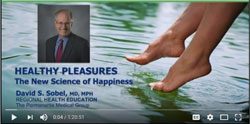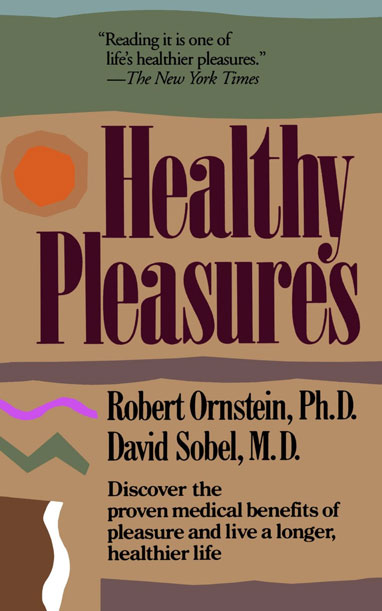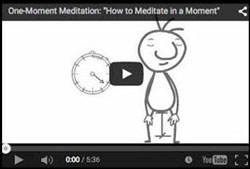Imagine a medical treatment that can help lower your blood pressure, decrease your risk for heart disease and cancer, boost your immune function and block pain. It’s safe, inexpensive and readily available. The main side effects include feeling good, an increased sense of well-being and greater self-confidence. Would you take it?
Many of us couldn’t begin to imagine such a treatment. But it turns out this remedy is readily available and inexpensive. And best of all, this “miracle drug” is produced by our brains in response to pleasure, happiness, optimism and positive mood.
“Mind-body” medicine – increasing our positive thoughts and emotions to influence physical health – is safer than medications sold through pharmacies, produces fewer negative side effects and provides longer-lasting results. But unlike swallowing a pill, such medicines require people to contribute time, energy and practice.
Savor Your Senses
Our senses – touch, taste, sight, smell and hearing – allow us to learn about and enjoy the world around us. Human beings evolved to seek out experiences that are pleasurable because they either increased individual or group survival. For example, our ancestors who sought out a variety of taste sensations and foods, were more likely to get a healthier mix of nutrients, survive, and pass on this propensity to later generations. We rely on our senses to protect ourselves from danger, but our sensory nervous system also has the power to reduce stress. To enjoy the positive health outcomes of our senses, try some of these mind-body medicines on for size.

Enjoy nature. Individuals who take time to look at nature – soaring trees, lush woods and wide-open parks – report a better mood, less stress and even recover from surgery quicker.
Experience touch. Human touch can calm the heart, lessen headaches, speed childbirth and increase survival in premature infants.
Listen to music. The emotional impact of music can reduce stress. In fact, music therapy has been used to improve mood in depression. In addition, music often results in movement and exercise adding to one’s physical well-being. And for people engaged in physical activity, music enhances the experience. As a result, listening to music has been shown to have a beneficial effect on blood pressure, heart rate, respiratory rate, anxiety and pain.
Take a siesta. People who nap frequently enjoy a nearly 40 percent reduction in deaths from heart conditions.

Eat chocolate. Numerous studies have demonstrated the health benefits of modest amounts of dark chocolate: from lowering blood pressure to reducing the risk of stroke and heart disease. And remember to savor each bite.
Kiss. According to the Western Journal of Communication, couples who engage in more romantic kissing are less stressed, experience higher relationship satisfaction and even have lower cholesterol levels.
Practice Happiness
Much of our distress comes not from the stress triggers themselves but from our own interpretations about our situation. These mental stories can be altered with positive results.
Rethink stress and embrace a healthy perspective. When feeling stressed, ask yourself these questions: Is this really as important as I think? If it is, will it be important in a week, a month, a year? Can I impact the situation by taking actions that will make a difference? Am I being objective about the impact or simply assuming the worst outcome? Am I taking the actions of others too personally? Sometimes, just pausing to consider such questions can lessen stress and help you adopt a more positive, optimistic frame of mind.
Do what you love. Enjoyable leisure activities can enhance well-being by acting as breathers, restorers and stress buffers. While different for everyone, they may include spending quiet time alone, visiting and dining with friends, belonging to clubs and religious groups, and pursuing hobbies. Research found that people who enjoyed these activities report greater life satisfaction and a lower incidence of depression. They also have lower blood pressure, reduced stress hormones, less obesity, better sleep and improved physical function.
Be present. Studies show that people report a better mood when they are focused on the present vs. when their minds wander. Surprisingly, the positive benefits of “mindfulness” apply to both pleasant and unpleasant activities. Remember, right now is literally the only time to be alive – and the only moment in which you can experience happiness. And it only takes a moment.

Take vacations. According to one study, taking regular vacations can lower cardiovascular risk by 30 percent.
Laugh heartily. Patients prescribed a humorous video for 30 minutes a day experienced a reduction in blood pressure, stress, need for medications and recurrent heart attacks. Even a forced smile can lower stress levels.
Be playful. Playfulness is “the predisposition to frame a situation in such a way as to provide oneself (and possibly others) with amusement, humor and/or entertainment.” Research indicates that adult playfulness is correlated with overall well-being, life satisfaction, increased physical activity and greater fitness.
Practice gratitude. Individuals who focus on what they are grateful for tend to experience less stress and depression, enjoy improved health, report fewer symptoms, and sleep better than those who embrace a “victim” mentality. Here’s a suggestion on how to practice gratitude: At the end of each day for two weeks, make a list of three things that happened over the previous 24 hours for which you are grateful. Then, write a note letting the individuals involved know how much you appreciate them.
Indulge In Altruism
People who volunteer and care about something other than themselves (think: people, pets, plants and the planet) tend to be both happier and healthier. In fact, helping others can buffer stress and reduce a person’s risk of death.

Help others. One of the most reliable ways to feel better is to do good for someone else. For example, pet owners enjoy a reduced rate of heart attacks compared to those without pets.
It’s better to give than to receive. Contrary to common belief, money can buy happiness – especially if it is given to others. In a novel experiment, participants received a sum of money. Half of them were instructed to spend the money on themselves and the other half on others. People who spend money on others feel significantly happier than those who spend money on themselves.
Kindness counts. Don’t let yourself forget about your good deeds. You can measurably improve your happiness simply by keeping a journal of your efforts to help others.
Embracing Happiness and Health
Many people worry that to promote health they have to adopt extremely restrictive diets, engage in punishing exercise, avoid all salt and shun cholesterol. Although each of these in moderation can contribute to improved health, participating in pleasurable activities also adds to happiness and health.

Scientific evidence now suggests that for most people, doing what is pleasurable actually pays off in both immediate enjoyment and better long-term health. The healthiest, most robust people seem to indulge in many small daily pleasures and cultivate a positive, optimistic view of their lives.
So taking a siesta, playing with a pet, talking to a friend, looking at nature, smelling a sweet scent, laughing at a funny movie and scores of other healthy pleasures may measurably improve your life, your health – and your happiness.
At the same time, neither commercially produced drugs nor “mind-body” prescriptions are cure-alls. Both have their usefulness and their limitations. Mental imagery, relaxation or other mind-body techniques are ineffective in treating medical problems such as infections, cancers and advanced heart disease.
But before concluding that there is a pill for every problem, remember that traditional treatment with drugs and surgery are not effective for a variety of medical problems, particularly those that result from stress and mild mood disorders. Very often a combination of mind-body techniques and traditional medical care is best.
Robert Ornstein was the author of more than twenty books, among them New World, New Mind, The Right Mind, The Evolution of Consciousness, and the best-selling The Psychology of Consciousness, now in its 4th edition. His final book, which he considered his most important, was the groundbreaking God 4.0: On the Nature of Higher Consciousness and the Experience Called “God.” He was the founder of the Institute for the Study of Human Knowledge, which is responsible for this Human Journey website. (See also: www.robertornstein.com.)
David S. Sobel, MD, MPH, Consulting Professor, Department of Medicine, Stanford University School of Medicine and former Medical Director of Patient Education and Health Promotion for The Permanente Medical Group and Kaiser Permanente Northern California. He practiced adult primary care medicine at the Kaiser Permanente Medical Offices in San Jose. He has worked with the Stanford Patient Education Research Center on the development and evaluation of the Stanford Chronic Disease Self-Management Program. He is coauthor of eight books including Living a Healthy Life with Chronic Conditions, Living a Healthy Life with Chronic Pain, The Healing Brain, Healthy Pleasures, Mind & Body Health Handbook, and What’s the Catch? How to Avoid Getting Hooked and Manipulated. He is recipient of the national Healthtrac Foundation Health Education Award, the Kaiser Permanente James A Vohs Award for Quality and Exceptional Contribution Award, and Honorary Fellow of the Society for Public Health Education.
In the series: Health and Education in the Modern World
Further Reading »
External Stories and Videos

Healthy Pleasures: The New Science of Happiness
David Sobel
The Health Benefits of Sensuality, Optimism and Altruism


